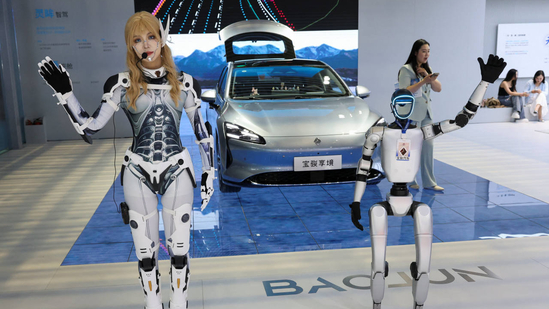Trade War Exposes China’s Dependence on U.S. for Auto Chips

Certain American chips are essential for cars and other industrial goods made in China—a vulnerability revealed in tariff exemptions pushed by Beijing.
At a recent electronics exhibition in Shanghai, semiconductor companies featured slogans such as “Offering complete domestic solutions” and “Use Chinese chips, love Chinese chips.”

That is the hope. The reality is that, love them or not, China still needs certain American chips that are essential for cars and other industrial goods.
The vulnerability was revealed when Beijing in late April exempted eight categories of U.S.-made chips from the 125% tariffs it imposed on American goods in the trade war with President Trump. The decision followed lobbying by Chinese automakers, said people in the industry.
One consequence of the trade war has been to expose each country’s pain points in its reliance on the other. Trump quickly exempted from his main tariff iPhones and certain other electronics that are made primarily in China, and Beijing flaunted its ability to hurt American industry by putting restrictions on the export of certain rare-earth minerals where China has a supply-chain chokehold.
The U.S. controls some chokepoints, too. Although they account for only a small portion of Chinese chip imports, the American products include key chips used in cars such as microcontroller units, which are like minicomputers, as well as analog chips to handle signals. These types of products were on Beijing’s exemption list, which removed tariffs for more than 90% of the chips China imports from the U.S.
China’s imports of semiconductors hit $412 billion in 2024, up 10% from a year earlier, Chinese customs data showed. Imports have grown over the past decade, even as leader Xi Jinping tried to promote national self-reliance.
Texas Instruments and European companies Infineon, NXP and STMicroelectronics as well as Japan’s Renesas have traditionally dominated automotive semiconductors. While these chips generally aren’t as advanced as the chips powering high-end smartphones and artificial-intelligence applications, a car can’t run without them.
With the rise of technology around the driver such as digital displays, voice commands and autonomous-driving features, Nvidia and Qualcomm chips have also become popular.
Beijing has told China’s carmakers that it would like them to ensure at least a quarter of the chips in their vehicles are made in China as of this year, people familiar with the discussions said. They described that goal as difficult to attain, with the proportion at about 15% as of late last year.
The Ministry of Industry and Information Technology, the main regulator of China’s auto industry, didn’t respond to a request for comment.
A chip in general could take a year and a half or two years to design. For autos, an additional two or three years are needed for testing and validation, given stricter safety requirements, said people familiar with the industry.
Big global semiconductor players tend to offer a full product portfolio for carmakers, and the carmakers are reluctant to turn to an untested local chip maker that might have only one or a handful of products.
Still, Chinese automakers said they now had little choice.
“The tariff war is sending a clear message: We need to move faster to replace American parts from the system,” said a supply-chain director at a state-owned carmaker.
Some Chinese automakers recently held talks with Western chip companies, including Texas Instruments and NXP, about producing more chips for China locally, people familiar with the discussions said.
At a big automotive show in Shanghai that kicked off in late April, the booth of the China Automotive Chip Alliance showed off local chip technologies. One local chip maker’s advertisement said the design and packaging of its products were “100% domestically controllable,” while a sign showed an integrated circuit with “Made in China” splashed across it.
At the earlier electronics show in Shanghai, a chip maker called Geehy Semiconductor posted a sign atop its booth reading, “Now is the time for homegrown players.”
Yang Chao, an engineer at the company, said one of its microcontroller units on display could replace similar products made by Texas Instruments and other foreign chip makers in cars or industrial automation.
Chao said use of Chinese chips advanced in 2021 during the pandemic-era chip shortage. Prices soared, and some buyers had no choice but to try Chinese chip makers, including Geehy, he said. Recently, the push for localization has brought in bigger clients, mostly in China but also some overseas including in Europe, he said.
“In the future, the world will know solutions from China are reliable and cost-effective,” he said.
Write to Raffaele Huang at raffaele.huang@wsj.com and Yoko Kubota at yoko.kubota@wsj.com
All Access.
One Subscription.
Get 360° coverage—from daily headlines
to 100 year archives.



HT App & Website







